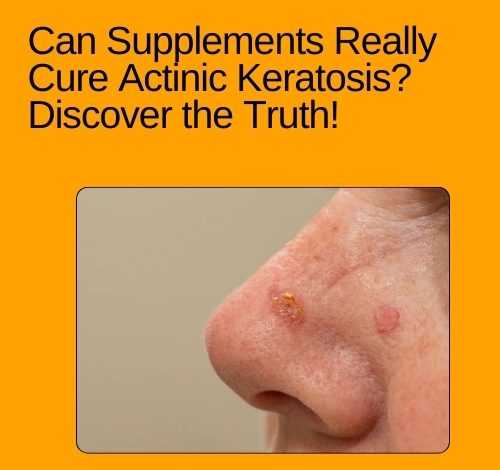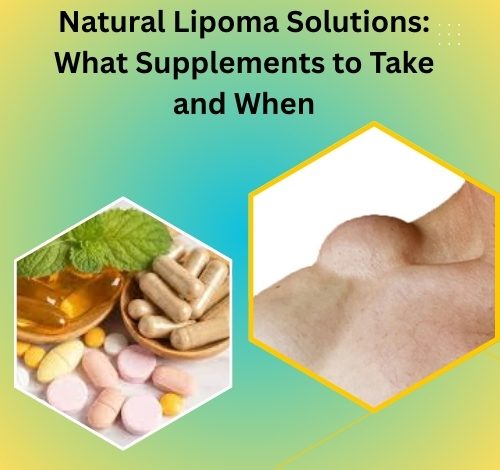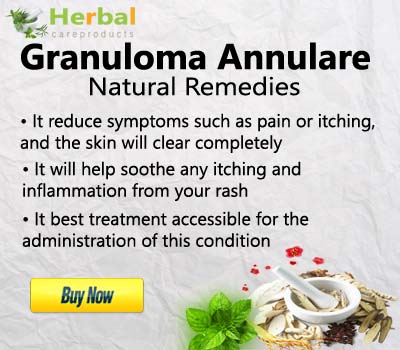Can Supplements Really Cure Actinic Keratosis? Discover the Truth!

Actinic Keratosis is a common skin condition that develops due to prolonged exposure to ultraviolet (UV) rays, often from the sun or tanning beds. It typically appears as rough, scaly, or crusty patches on sun-exposed areas like the face, scalp, ears, and hands. While these patches may seem harmless at first, they are actually considered precancerous, meaning they can potentially develop into squamous cell carcinoma—a type of skin cancer—if left untreated.
In recent years, there has been a growing interest in using Buy Best Herbal Supplements Products and Natural Remedies to support skin health. But the big question remains: Can supplements really cure actinic keratosis? Let’s explore the truth.
What is Actinic Keratosis?
Actinic keratosis (AK) is a precancerous skin condition caused by long-term exposure to ultraviolet (UV) radiation, mainly from sunlight or tanning beds. It appears as rough, scaly, or crusty patches on the skin, often found on areas frequently exposed to the sun, such as the face, scalp, ears, neck, forearms, and hands.
These patches may be red, pink, brown, or flesh-colored, and they often feel like sandpaper. While they may start small and painless, actinic keratoses can grow slowly over time and sometimes itch or become irritated.
Common Symptoms of Actinic Keratosis:
- Dry, rough, or scaly patches on sun-exposed skin
- Flat or slightly raised spots
- Itching, burning, or tenderness in the affected area
- A hard surface or crust on top of the patch
Can Supplements Really Cure Actinic Keratosis?
Actinic Keratosis (AK) is a skin condition caused by prolonged exposure to ultraviolet (UV) radiation from the sun or tanning beds. It appears as rough, scaly, or crusty patches—often on the face, scalp, arms, or hands—and is considered a precancerous skin lesion. Because AK can potentially develop into squamous cell carcinoma (a type of skin cancer), proper diagnosis and treatment are essential.
What Supplements Can Do for Actinic Keratosis
While Actinic Keratosis Supplements do not provide a cure, certain vitamins, minerals, and Herbal Treatment for Actinic Keratosis may:
- Support the body’s ability to repair sun-damaged skin
- Strengthen the immune response to abnormal cell growth
- Reduce inflammation and oxidative stress
- Help maintain healthy skin function
Popular Supplements for AK Support
- Vitamin D – Supports skin cell growth and immune function
- Vitamin E – Antioxidant that helps repair sun-damaged skin
- Green Tea Extract – Rich in EGCG, which protects against UV-induced skin damage
- Omega-3 Fatty Acids – Anti-inflammatory support for skin healing
- Curcumin (Turmeric) – May inhibit abnormal skin cell proliferation
- Milk Thistle – A natural herbal treatment for actinic keratosis that aids detox and skin health
- Zinc and Selenium – Trace minerals important for skin repair and immune support
Related Articles: 11 Natural Treatments for Actinic Keratosis
What Supplements Cannot Do
It’s important to understand that supplements are not a replacement for medical treatment. They do not remove AK lesions, nor can they guarantee prevention of progression to skin cancer.
Medical treatments for AK include:
- Cryotherapy (freezing the lesions)
- Topical chemotherapy (like 5-fluorouracil or imiquimod)
- Laser therapy
- Photodynamic therapy (PDT)
Supplements may be used alongside these treatments, but not instead of them.
The Bottom Line
No, supplements cannot cure actinic keratosis. However, they can be part of a supportive health strategy aimed at improving skin resilience, reducing inflammation, and aiding overall wellness. If you’re considering using supplements or herbal remedies, it’s best to speak with your dermatologist to ensure safety and proper integration with your treatment plan.
The Role of Supplements in Actinic Keratosis
Supplements are often marketed as natural solutions to various health problems, including skin conditions. When it comes to Actinic Keratosis, many people turn to dietary and herbal treatment for actinic keratosis in hopes of avoiding invasive procedures. These supplements typically include antioxidants, vitamins, minerals, and plant-based compounds that may promote healthier skin and aid in reducing inflammation and oxidative stress.
Some of the most commonly used supplements for actinic keratosis include:
- Vitamin D3 – Helps regulate skin cell growth and supports immune function.
- Green Tea Extract (EGCG) – A potent antioxidant that may protect the skin from UV damage.
- Curcumin (Turmeric) – Reduces inflammation and may slow down abnormal skin cell activity.
- Omega-3 Fatty Acids – Help reduce skin inflammation and improve elasticity.
- Milk Thistle (Silymarin) – A herbal treatment for actinic keratosis with liver-detoxifying and skin-protective properties.
The Truth: Can Supplements Cure Actinic Keratosis?
No, supplements cannot cure actinic keratosis. While they can support overall skin health and help manage symptoms, they are not a replacement for clinical treatments prescribed by dermatologists.
Actinic keratosis is a precancerous condition that requires medical attention. Standard treatments include:
- Cryotherapy (freezing the lesions)
- Topical medications (like fluorouracil or imiquimod)
- Laser therapy
- Photodynamic therapy
- Regular dermatological monitoring
Supplements can play a supportive role, but relying on them as the sole treatment is not advisable. Their primary benefit is in reducing inflammation, enhancing skin repair, and strengthening the body’s natural defense mechanisms.
Related Articles: Actinic Keratosis Natural Treatment
Where Supplements Fit In
Think of supplements as part of a holistic skin care plan—not a cure. They may help:
- Prevent new lesions from forming
- Improve skin texture and healing
- Reduce oxidative stress caused by UV exposure
- Boost immune response to abnormal skin cells
For those looking for a natural and complementary approach, using a high-quality herbal treatment for actinic keratosis alongside dermatological care can offer some benefits, especially when paired with sun protection, a healthy diet, and regular skin checks.
Final Thoughts
While the idea of curing Herbal Supplement for Actinic Keratosis is appealing, it’s essential to separate myth from medical reality. Supplements and herbal treatments can be beneficial allies in skin health but should never replace professional medical treatment for actinic keratosis.
If you suspect you have actinic keratosis or are looking for ways to manage it naturally, consult with a dermatologist. They can guide you in combining effective clinical treatments with supportive supplements safely.




